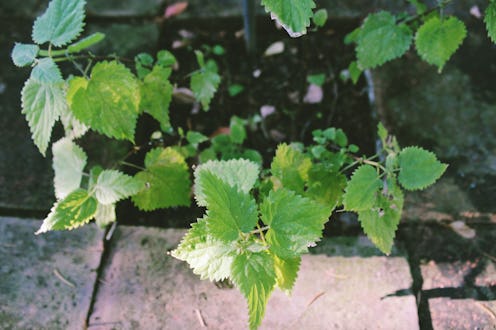
Most of us think of weeds as annoying shrubs that ruin the aesthetics of a yard or garden with zero value. But before you pluck and discard, make sure stinging nettle isn't one of those weeds — unless, of course, you have no interest in making an all-natural tonic that is amazing for your hair and skin. Nettle, often called stinging nettle, is a group of plants that have stinging hairs in appearance and typically, touching those hairs will make you recoil in shock and pain. However, if you can stand the mild sting (or just have a great pair of gardening gloves), you can pick fresh nettle to make a nettle tea tonic that has some super rad skin and hair benefits.
According to sources at Stylecraze, stinging nettle or common nettle, is rich in vitamins A, B, C, D, and K — all amazing stuff for struggling, dry tresses, and achieving even-toned skin. Nettle tea is common in folklore because of its long-standing healing properties with arthritis and allergies which are attributed to the anti-inflammatory properties found in nettle's leaves, according to the Arthritis Foundation. Nettle tea is a tonic that cures what ails you, according to sources at Natural News, drinking nettle tea to naturally cleanse and remove waste from the body. Using nettle tea topically can yield similar results by naturally cleansing the skin and scalp and creating a healthy environment where hair grows full and our skin remains calm and smooth.
Like many natural treatments, most evidence of these nettle benefits remain mostly anecdotal, so I can't guarantee your hair will grown down to your knees after a few cups of tea (and, of course, if you have an allergic reaction to the tea, stop using the stuff). I can, however, share seven of my personal favorite ways to use the stingy weed.
1. Hair Growth
According to my favorite hair gurus at Curly Nikki, nettle tea is amazing for hair growth. By improving scalp circulation, it gives your hair follicles a chance at growth while even decreasing the amount of hair shedding.
2. Treat Hormonal Acne
Since nettle tea has been used for women to treat hormone imbalances during and after pregnancy, it's not too surprising that applying the tea topically on acne can be used to treat acne. Having studied my own acne for years, I've realized that the biggest and most painful pimples tend to occur right before my period, the same time that I'm sobbing over subway delays, lack of candy, and world peace. I used nettle tea as a face tonic and found that those annoying pimples under my skin disappeared before the end of my period.
3. A Gentle Astringent
Tea Tree Oil, $11, Amazon
During the summer, my astringent choices are hardcore: straight lemon juice from a lemon, cut with some apple cider vinegar. I am an oily mess in the summertime and my thick hair oils doesn't help. Luckily for me, nettle tea doubles as a natural astringent for oily babes. I can tell you from experience that it feels more gentle on your skin than citrus and alcohol. Use nettle tea as a base and add a few drops of tea tree oil for an acne-controlling astringent.
4. Youthful Looking Skin
Vitamin C is widely regarded as great for our skin, so it's great that nature provides us with so many sources of the stuff. Nettle tea is one ingredient filled with the vitamin C and D that can keep your skin looking fresh and glowing.
5. Relieve Dark Spots
Inflammation is a huge part of acne formation, so any ingredients with anti-inflammatory properties should make your pimples go down. That includes scarring from old zits as well.
6. It May Be The Cheapest, Most Effective Beauty Hack Ever
Nettle often blooms naturally in the spring and if you happen to find any in your garden, this may actually be one of the most inexpensive hair growth treatments on the market. You can head to a local park with just a pair of gloves to pluck your own nettle (the U.S. Department of Agriculture has a handy identification guide). If nettle's not around, try a local tea shop first. Still coming up short? The Internet is overflowing with nettle tea sources.
Image: Nature And, David Eickoff /Flickr; Kristin Collins Jackson (5)